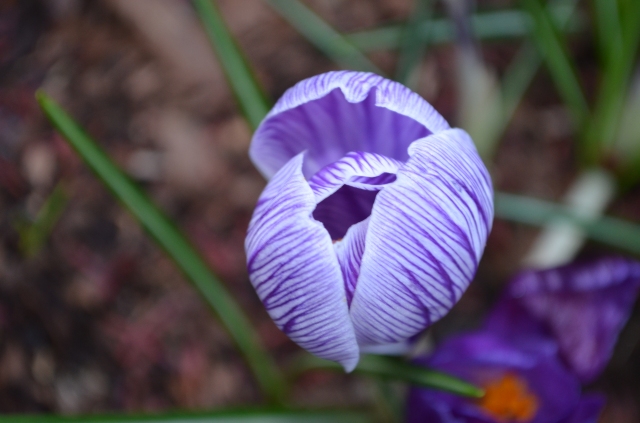
Photo by Jen Cherewaty
Got Sneezing & Sniffles from Seasonal Allergies?
by Jen Cherewaty RAc, RTCMP~ Registered Acupuncturist & Chinese Medicine Herbalist
Beautiful blossoms are starting to open on trees all around Vancouver town. For people with seasonal allergies this invites the return of seasonal allergy symptoms including sneezing, itchy eyes and throat, frontal headache, irritability, loss of smell, a heavy sensation in the head and profuse, clear nasal discharge. If severe, there can be coughing and asthmatic breathing.
Causes
All allergy symptoms arise when your body’s immune system identifies a normally harmless substance (tree pollens, grasses) as a threat to the body and tries to expel these substances from the body.
- Wind & Damp~While several Chinese patterns may be involved, wind (seen as itchy eyes, sneezing and sudden onset) and damp (seen as mucous and nasal congestion) are the dominant symptoms.
- Past History~most patients with allergic rhinitis have a history or being treated with repeated antibiotics as children
- Stress~high stress without adequate rest to recover depletes the adrenal glands and thus reduces the overall ability of the immune system to function at its best
Types
Seasonal allergic rhinitis is divided into 3 types;
- Spring Type~allergens are usually tree pollens
- Summer Type~allergens are usually grass pollens
- Fall Type~allergens are usually weed pollens (the most common is ragweed)
- Perennial~without regard to season & usually due to fungus spores, dust containing insect feces & proteins and animal dander
Try these 5 Tips from Traditional Chinese Medicine to Reduce Seasonal Allergy Symptoms;
1. Clearing the Wind & Damp
Chinese Herbal Medicine
Oddly enough, one of the main herbs to treat the damp part of seasonal allergies is magnolia buds (chinese name xin yi hua). Other herbs such as Angelica dahurica (bai zhi) and Xanthium sibiricum (cang er zi) are also super effective. Clearing wind is accomplished by such as Japanese catnip ~Schizonepeta tenuifolia (jing jie) and Siler divaricata (fang feng).Your chinese medicine practitioner can combine a nice blend to address your specific symptoms or give you a ready made formula such as Bi Yan Pian (Nose Inflammation Pills) or Allerease (by Blue Poppy).
Western Herbs
- Butterbur ~some studies show this to be as effective as prescription antihistamines without the side effect of drowsiness. Caution is advised if you have a known ragweed allergy, as Butterbur is of the same family, and if taken it will worsen, not alleviate your symptoms.
- Quercetin ~ a natural antihistamine
- Euphrasia officinalis (Eyebright) ~has been used to effectively treat the symptoms of hay fever – especially the congestion and watery eyes.
2. Acupuncture
Treatment with acupuncture varies for each person and their individual symptoms. The relief is often immediate and the effect lasting temporarily to complete remission. Insertion of points around the nose, wrists and hands is common. Shang xing (GV23), ying xiang (LI20), feng men (UB12), lie que (Lu7) and bi tong (Extra point) are commonly used points.
A study in the September 2004 issue of Allergy has concluded that a combination of Chinese herbs and weekly acupuncture sessions may be more effective than a placebo at relieving the symptoms of seasonal allergic rhinitis. (1)
3. Drink Green Tea
The catechins found in green tea have an antihistamine effect, and drinking green tea may alleviate the symptoms of springtime allergies.
4. A Little Dap will Clear Ya~Aromatherapy
I always dab a few drops of White Flower Oil on certain points to open the orifices of the nose, eyes and ears which often brings instant relief to congested patients.
5. Take a Break from Ice Cream to Reduce Your Dripping Nose~Diet
What you eat can actually decrease the amount of phlegm and congestion in your sinuses. This is because the spleen is the digestive organ in Chinese Medicine physiology and the Spleen dislikes cold and damp and too much sweet as these foods tend to increase mucous buildup. Since ice cream is cold, damp and sweet… say goodbye to ice cream and eliminate or reduce sweets, dairy and cold foods. The spleen loves soups, room temperature salads, lightly steamed veggies and boiled grains as these foods are easy to digest and create very little mucous.
If you liked this post, comment below and share with any allergy sufferers you know. Thanks so much! Jen Cherewaty RAc, RTCMP
References
- Management of Allergic Rhinitis in the Working-Age Population . Summary, Evidence Report/Technology Assessment: Number 67. AHRQ Publication No. 03-E013, February 2003. Agency for Healthcare Research and Quality, Rockville, MD. www.ahrq.gov/clinic/epcsums/rhinworksum.htm.
- Treatment of Western Medical Disease with Chinese Medicine. Allergic Rhinitis. Bob Flaws